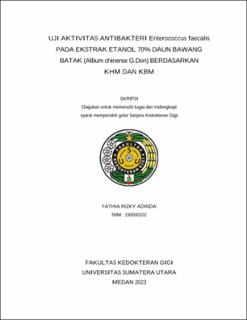Uji Aktivitas Antibakteri Enterococcus faecalis pada Ekstrak Etanol 70% Daun Bawang Batak (Allium chinense G.Don) Berdasarkan KHM dan KBM

View/
Date
2023Author
Adinda, Fathia Rizky
Advisor(s)
Octiara, Essie
Metadata
Show full item recordAbstract
Enterococcus faecalis (E.faecalis) is a major pathogen related to endodontic treatment which has resistance properties to antimicrobial agents. Batak leaf (Allium chinense G. Don) is a typical North Sumatra herbal plant which contains antibacterial substances. This study aims to determine the antibacterial effectiveness of the 70% ethanol extract of Batak leaves (A. chinense) against E.faecalis.
This research is a laboratory experimental study with a posttest only controlled group design. The sample used was E. faecalis tested by 7 groups of 70% ethanol extract concentration of Batak leek (A. chinense) and 2 control groups. This study used the Kirby-Bauer disc diffusion method to determine the Minimum Inhibitory Concentration (MIC) and the streaking method of the MIC determination test to determine the Minimum Inhibitory Content (MBC). Analysis of the research data to determine the MIC value using the Kruskal-Wallis test (p<0.05) followed by the Mann-Whitney test and the determination of the MIC value using the oneway ANOVA test (p>0.05) followed by the Post-Hoc Test LSD.
The results showed that the 70% ethanol extract of Batak leaf (A. chinense) had antibacterial activity. The 70% ethanol extract of Batak leaves (A. chinense) was able to inhibit E.faecalis starting from a concentration of 0.78% with an average of 6.8±0.10 mm and killing power of 55.76% up to a concentration of 50% with an average of 10.47±0.15 mm and a killing power of 89.41%.
The concentration of 70% ethanol extract of leek batak concentration of 50% was determined as the most effective concentration in inhibiting E.faecalis. The MIC value of 70% ethanol extract of Batak leaves (A.chinense) against E.faecalis was found at a concentration of 0.78%. The KBM value could not be found because among the seven extract concentrations it had not been able to reduce the number of bacterial colonies by 98% -99%.
Collections
- Undergraduate Theses [1985]
